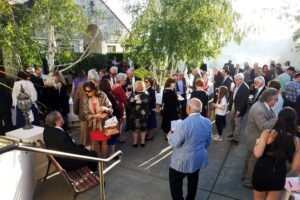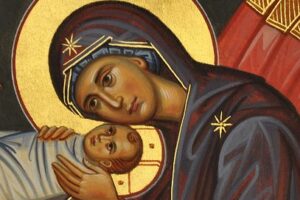In a recent gospel reading (Luke 18:18–25), we heard of a wealthy prince who came to the Lord and asked Him, “Good Teacher, what must I do to inherit eternal life?” to which the Lord responded; “Why dost thou call me good? There is only One who is good, that is God.” The Lord continued by telling him that he must obey the commandments, to which the prince responded that he had observed all these things from his youth up. When the Lord heard this, He explained to the prince that there was one thing for him left to do to inherit treasure in heaven, and that was to sell all that he had, give the money to the poor, and follow Him. It was here that the prince made a choice not to fulfill this last commandment of the Lord and to follow Him, thereby losing for himself eternal blessedness in heaven.
Besides the obvious meaning of this, since the Lord Himself lamented this man’s choice, saying how “a wealthy man will hardly enter into the Kingdom of heaven,” there is more to understand here for us—especially as we are nearing the beginning of Great and Holy Lent.
The gift, which defines us as human, is that of freedom of choice, and yet it is these choices that so frequently precipitate our spiritual downfall. How often we hear—through our services and prayers, homilies, Confession, and even from our own consciences—what we need to do in order to inherit not only eternal life, but eternal blessedness in the Kingdom of Heaven, and yet we choose not to follow them. Often this follows simply from our laziness or lack of desire to rid ourselves of our poor habits and, of course, we need to work on this within ourselves. However, far worse than this is when we knowingly choose not to follow these salvific instructions, judging for ourselves what we think is necessary for our salvation and not as we are taught by God and His Holy Church.
The consequences of such choices can be devastating to our eternal souls. Imagine if you found out from your doctor that you had a cancerous tumor or other life-threatening malady which would require a procedure, performed by a professional, who has trained in such procedures for many years. But instead of trusting him to use that knowledge and training to save your life, you decide to “cure” yourself. The outcome is obvious—the body dies. Making such a foolhardy choice when it comes to the “curing” of your soul, the result is frequently the same. However, the death of the soul is for all eternity. God forbid!
By the time this newsletter comes out, we will be within days of the beginning of Great and Holy Lent. Of all the fasts during the year, Great Lent is the most important. Regardless of how well or poorly one fasts in a physical sense (especially given one’s physical health and the like), it must never be forgotten that the primary reason for the fast is to properly reset our priorities, specifically, to put our physical needs “on the back burner” while putting our spiritual needs on the front, where they truly belong. Let us make the good choice of doing the very best we can this Lent, and in all of our lives, as the Holy Church teaches us, and not lose the priceless guidance given to us for the sake of the salvation of our souls, through our own arrogance. As was made clear from this Gospel reading that simply being a good person is not enough, let us, as the Lord himself taught us, “deny ourselves, take up our cross and follow Christ” (Mk. 9:37), Who leads us into the eternal Kingdom of God.
God bless!
—Fr. Alexander




